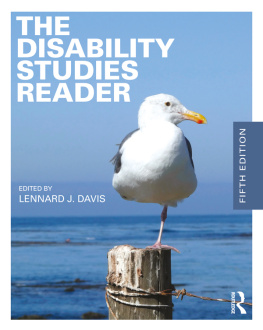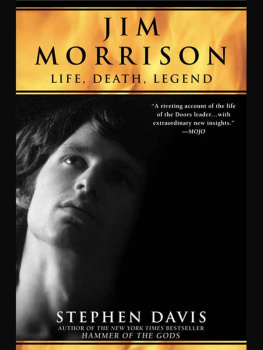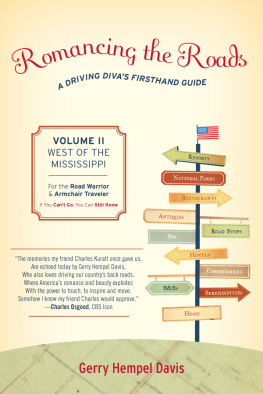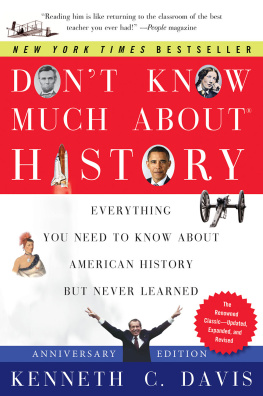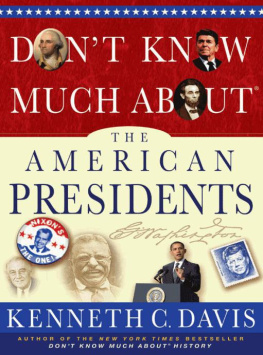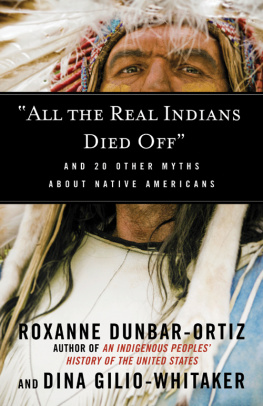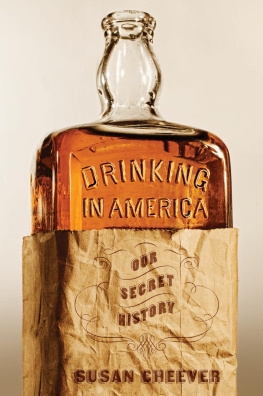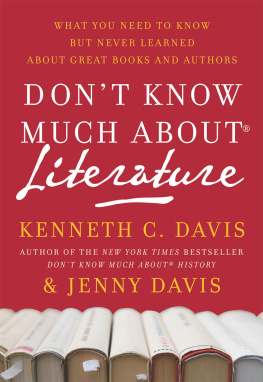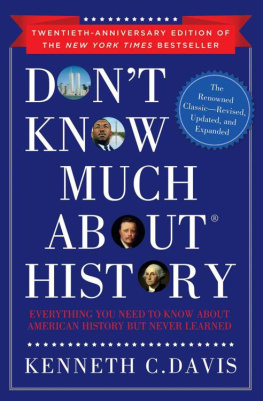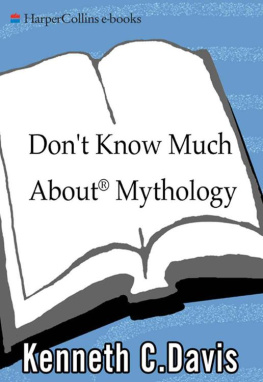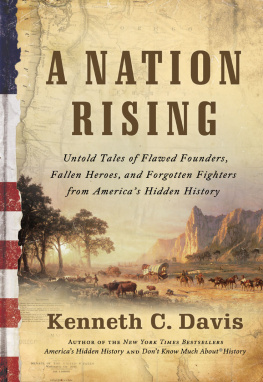Kenneth C. Davis
If you are of a certain age, the name Flip Wilson may mean something to you. After all, comedian Flip Wilson made history. During the early 1970s, the late comic became one of the first African American stars to host a hit television series. With his prime-time variety hour, Wilson helped put some of the color in color TV. But Flip Wilson might not be the first name you would expect to find in a book about Americas beginnings.
Here it is, though, because one of his signature routines was a sketch in which Wilson, bewigged, bejeweled, and fabulously bedecked in elaborate drag, played Spains Queen Isabella. The queen is pondering whether to give Columbus what he wants when the Italian sailor whispers something into the regal ear. Sashaying across the stage, Wilsons Isabella exults in a triumphant falsetto, Chris gonna find Ray Charles!
And that, my friends, is what Columbus was really looking for when he sailed from Spain in 1492.
I relate this story because my historical sensibilities have admittedly been shaped by bits from Flip Wilson, Laugh-In, Mr. Peabodys Wayback Machine, and Mad magazine, alongside such masterly historians as William Manchester, David McCullough, Doris Kearns Goodwin, and Thomas Flemingand because I have always believed that history should be much more fun than most Americans believe it is. But fun doesnt have to mean frivolous.
Take Isabellas Pigs, the opening chapter of this book. If it were a movie, Johnny Depp might get the lead. If it were a video game, parents wouldnt let their kids play. Spotlighting the Spanish conquest of Florida long before Jamestown and Plymouth were settled, it includes pirates, shipwrecks, lost treasure, cannibalism, torture, and numerous massacres, all topped off by feuding monarchs who put the current crop of royals to shame. And pigs.
It was, after all, the real Isabella who told Columbus to pack some pigs on his second voyage. Those pigs kept Spains conquistadors alive as they laid waste to the Americasand the pigs also possibly introduced some of the diseases that wiped out whole native nations. So Isabellas pigs may have played a leading role in the accidental discovery and conquest of the Americas and the decimation of millions of peoplecertainly one of historys great unintended consequences.
Another of those world-changing accidents came when a brash, untrained young militia officer in colonial America led his men on a murderous raid that set off the first world war in history. That ambitious twentysomething was George Washington, and his first brush with battle was nearly his last. Young Washingtons deadly miscalculation not only altered history but also clearly helped forge the man who led America through the Revolution and became its first president.
It is those unintended consequences, particularly the ones that were overlooked or sanitized in gilding Americas great national mythColumbus as intrepid discoverer, Pilgrims and Indians at a joyous feast, the Continental Congress as a colonial-era Kiwanis clubthat lie at the heart of this book. The stories that unfold in these six chapters, which span a period from the Spanish arrival in America to George Washingtons inauguration in 1789, were selected because each plays a central part in shaping the nations destiny and character and each, in some way, belies that American myth.
For the most part, these are tales that the textbooks left out. The picture they present is largely at odds with the safe, sterile version still provided by schoolbooks, teachers, and Hollywood. Those tidy tableaus are the ones preferred by politicians, preachers, and pundits who cling to the simple, whitewashed portrait of Americas past. If any of the harsher realities found their way into our schoolbooks, they were boiled down to a single bloodless line of text, or worse, to a monotonous list of dates and documents. In these stories, Ive tried to flesh out that picture and set the record straight by unearthing some of the buried pieces of Americas hidden history.
Some of these episodes were chosen because they reveal unfamiliar details about familiar events, such as the battles of Lexington and Concord. And some uncover the unknown side of very well-known people, as in the rise and fall of a young American hero whose ego and greed wreaked havoc, turning him into Americas greatest villain: Benedict Arnold. Others were chosen because they include fulcrum moments in which Americas future was tipped in a new direction. Such a shift came when a British assassination plot aimed at a trio of Bostons leading patriots went awry. Had the plandetailed in Warrens Togasucceeded, the course of the Revolution might have been completely altered.
These stories also highlight what novelist Graham Greene called the human factor. Textbook writers rarely explore such human motivations as ambition and avarice, loyalty and betrayal, duty and honor, courage and cowardice. They prefer to leave pride and prejudice to the novelists. But these stories fascinate because they plumb the flesh and blood behind the marble statues or the faces on our currency. The three Puritan women depicted in Hannahs Escape never made it onto any of our money. But the courage and resilience they displayed speaks loudly of a harsh colonial environment far removed from the traditional Thanksgiving Day idyll.
Most importantly, all of these stories continue to reverberate in our world. And that is the real point of telling themand of teaching historyin the first place. We have been conditioned, by television and now the Internet, to look at history in short bursts. These disjointed bits and pieces rarely seem to have much connection to the present. But of course they do; as Shakespeare put it, The past is prologue.
The great conflict engulfing the Western world and elements of Islam is the most immediate and pressing example of historys long, slow ripples. It returns us to Isabellas triumphant Chris gonna find Ray Charles. To most Americans, 1492 means only one thing: Columbus sailed the ocean blue. But that is only one part of the story of that year. A dynamic, extraordinary woman in a mans world, Queen Isabella also set in motion two other events in 1492 that remain fulcrum moments for our times: the forced conversion or exile of Spains Jews and the culmination of la reconquista the Reconquestin which Spanish armies defeated the last remnant of the Moors, the North African Muslims who had invaded and then occupied the Iberian peninsula for centuries.
So why does that matter? The bombers who struck Madrids commuter railroads with murderous force on March 11, 2004, saw their attack as long-deferred vengeance for 1492. Their hope for an Islamic Reconquest of Spain was not some radical religious fantasy but has a long, bitter history. It animates their jihad. And yes, some peoples historical memories are much longer than others.
Historys ripples also wash over current American political debates. At a time when Hispanic Americans constitute the fastest-growing demographic group in America, the country found itself in the midst of a white-hot controversy that mushroomed over broken borders, immigration reform, and establishing English as Americas official language. In fact, Spanish has been spoken in a good part of America far longer than English has. No, that is not an argument for or against any official language in America. It is simply a historical reality, much overlooked.


